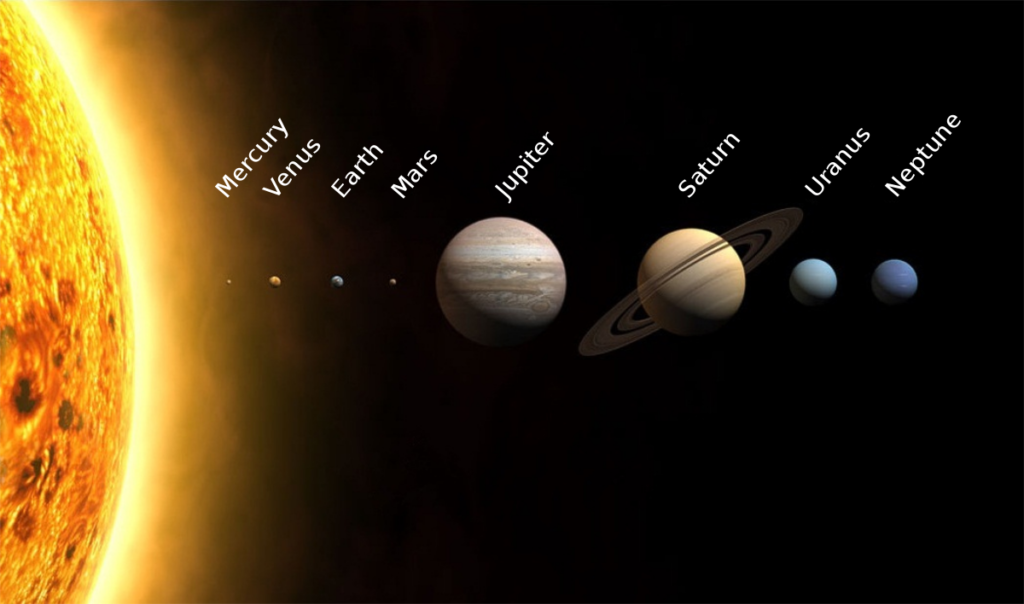Back to: GEOGRAPHY SS1
Welcome to class!
In today’s class, we will be talking about the solar system. Enjoy the class!
The Solar System: The Universe, The Planets, The Earth

Solar system
The solar system is the description of the position of the earth and other planets in relation to the sun. The solar system comprises of the sun and the nine planets. All the planets revolve round the sun in “elliptical orbits”.
The universe
It is made up of many heavenly bodies, group of stars form clusters which are known as galaxies or nebulas. Our local groups or galaxy i.e. the earth galaxy is known as ‘The Milky Way’. It contains twenty-seven galaxies.
A satellite is a smaller body which moves round a planet. The moon is the natural satellite of the earth.
Below is a summary of the components of the solar system
| Planets | Number of satellites | Distance from the sun in Km | Years it takes to complete revolution |
| None | 57,600,000 | 88 days |
| None | 107,200,000 | 225 days |
| One | 148,800,000 | 365 days |
| Two | 227,200,000 | 687 days |
| Twelve | 772,800,000 | 11.9 years |
| Nine | 1,417,600,000 | 29.5 years |
| Five | 2,854,400,000 | 84 years |
| Two | 4,468,800,000 | 164.8 years |
| None | 5,850,000,000 | 247.7 years |
Evaluation
- What is a solar system?
- Define
- Galaxy
- Satellite
- Orbit
Other important specifications of the nine planets
Mercury:
- This is the smallest planet.
- It is the closest planet to the sun.
- It is the hottest planet being the closest to the sun.
- It contains no living thing because of its high temperature.
- It has the shortest orbit round the sun.
Venus:
- This is the second closest planet to the sun.
- It contains no living thing.
- It is often referred to as THE EARTH TWIN because of their close proximity in size, mass and density.
Earth:
- This is the only planet where life exists. This is because earth is the only planet that contains oxygen, and force of gravity.
- It has one natural satellite known as Moon.
Mars:
- This planet is believed to have the possibility of supporting some plant’s life.
- It has two satellites.
Jupiter:
- This is the largest planet in the solar system.
- Its surface contains gases such as hydrogen and methane with light and dark bands.
Saturn:
- This is the second-largest planet after Jupiter.
- It has three rings around it.
Uranus:
- This is the only planet that revolves round the sun in a clockwise direction.
- It takes Uranus 84 years to complete its orbit.
Neptune:
- This planet is very cold because of its distance from the Sun.
- It has two satellites
Pluto:
- This is the farthest planet from the sun.
- It is the coldest planet.
- It has the longest orbit round the sun
Evaluation
- Describe the universe.
- Give at least one characteristic of each of the planets.
General evaluation
- What is a solar system?
- Name the first four planets and describe their characteristics.
- State the characteristics of the last planet.
- What is a satellite?
- Mention the satellite of the earth.
Reading assignment
Essential Geography, O.A. Iwena, Pages 5-7.
Theory
- What is a solar system? List the 9 planets in order of their distance from the sun.
- State three characteristics of the planet Earth.
In our next class, we will be talking about the Earth as a Planet. We hope you enjoyed the class.
Should you any further question, feel free to ask in the comment section below and trust us to respond as soon as possible.

Mercury isn’t the hottest planet that orbits the sun it’s Venus that is the hottest
Mercury is the hottest dear, not Venus. Mercury is the closest planet to the sun hence it’s the hottest. Venus is even millions of kilometers away from Mercury not to talk of the sun.
Venus gases traps heat from the sun unlinke mercury where the heat bounces of so venus is hotter
Venus is the hottest planet because of it atmosphere
Venus is the hottest because it has
1. Active Volcanoes
2. Greenhouse Gases leading to trapped heat
3. It has a thick atmosphere
Mercury is the hottest
Mercury is no longer considered the hottest planet; advancements in science and technology have revealed that Venus actually holds that title. look it up online
the essential textbook is old therefore as old info
your brain is working
Mercury is the hotest planet
Why is mercury earth twin?
not it’s mars that is earth twim
no Venus that is the earth twin
it is mars
that’s Venus look it up
Mercury is not the earth twin , mars is the earth twin
Venus is the hotest planet in the solar system because mercury has no atmospheric condition.
Check this !
brilliant
We’re glad you found it helpful😊 For even more class notes, engaging videos, and homework assistance, just download our Mobile App at https://play.google.com/store/apps/details?id=com.afrilearn. It’s packed with resources to help you succeed🌟
Venus is the hottest planet because it contains greenhouse house gases like carbon dioxide even though it is farther from the sun than mercury
that is a big lie, mercury is the hottest planet not Venus, Venus is the second hottest planet
Guys, stop confusing my intelligence🤔🤔, which of you have gone and felt how hot each planet is. For now I believe it’s mercury until proven wrong. Thank you.
yes ooo
very helpful and useful may ur memory not get Lost
very helpful and exciting, the Lord God will enrich your memory.